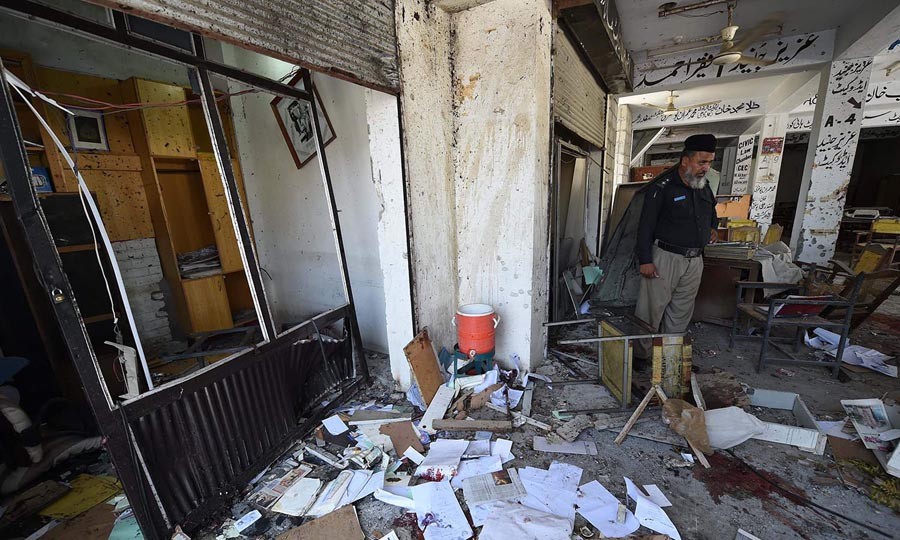
Recent episodes of violence hint at the structured elimination of Pashtun intellectuals

If the decline in the instances of deadly episodes of militant violence is any indication of state’s gains, then the government has notched up significant successes. Nevertheless, the occasional occurrences of deadly bomb blasts and suicide attacks demonstrate that something is seriously lacking in the state’s fight against Taliban militancy.
According to data compiled by South Asia Terrorism Portal (SATP), 43, 25, 19 and 14 suicide attacks took place in Pakistan in 2013, 2014, 2015 and 2016 (till September 4) respectively. The statistics show that the state has made strides in arresting the Taliban capacity to unleash terror at will. Of late, the terrorists have been picking soft targets especially after the APS Peshawar tragedy in December 2014, apparently out of desperation owing to their losses in the country’s northwest.
For the last one month or so, the primary focus of militants’ targeting of noncombatants on either side of the Pak-Afghan border is a single ethnicity: Pashtun. It is not just the fatalities that terrorism engenders. Its more worrying aspect is the weakening of the national bond. Among the Pashtun nationalists and intelligentsia, there is huge frustration. Background discussion with the duo and their social media posts suggest that there is an organised plan for the structured elimination of Pashtun intellectuals on the one hand and fomenting unrest in the Afghan and Pashtun mainland on the other. They firmly believe that a number of recent episodes of violence lend credence to their worldview.
From August 8 suicide attack in Quetta, militant violence in Peshawar, targeting Christian community, and suicide attack on lawyers in Mardan and attacks on American University Kabul and defence ministry in the Afghan capital are all glaring examples of Pashtun being the primary target of terrorism.
On the other hand, the official response to Taliban terror from either side of the Durand Line has been one of externalising the blame. Both sides believe that each of them is the victim of terror orchestrated by the other side. As a matter of fact, blame game won’t work. It never has. Owning up to the mess that the two neighbours are mired in will necessitate a few corrective steps.
The first reality that Pakistan and Afghanistan should come to terms with is that Taliban are a transnational threat. They are the common enemies of the two states. Much like Pakistan, Afghanistan seems to have its good and bad Taliban types too. The two neighbours should understand there simply are no good Taliban. Put differently, tackling the Taliban threat needs coordinated and joint efforts on the part of Islamabad and Kabul with an understanding that Taliban of all hues are the common enemies of the two states.
Second, just regularising movement across the Pak-Afghan border will not thwart terrorism unless it is accompanied by preventing taking bribes both at the border and at the security checkposts particularly within our jurisdiction. There should be zero tolerance policy for taking bribes, at least when it comes to transporting explosives on either side of the border.
Third, the visible state should be least visible. The presence of security checkposts and security personnel should give way to extensive intelligence gathering. The visibility of state apparatus has two-fold disadvantages. For one, checkposts are an undue hindrance to public movement. What has been observed is that the occurrence of militant violence leads to increasing the number of checkposts, which in turn only increases public worries. The simple question is: did security checkposts or the visible state for that reason help thwart terror?
When I posed the same question to a senior security officer, his reply was that rarely has a checkpost helped in either apprehending the terrorists or seizing explosives. On the other hand, in back ground interviews, security officers contend that intelligence has been instrumental in thwarting terror.
Besides, the visibility of security personnel gives terrorists an easy target to strike at. They know that security personnel and checkposts are the only hurdles they need to avoid before reaching the target.
For Pakistani leadership, the ever increasing need is to score victories on diplomatic front rather than merely hiding their failures behind the bogey of alleged Indian involvement inside the country. Doing so requires establishing friendly relations with Afghanistan in the earnest. Starting with Taliban as the common enemy of the two states will lay a solid foundation for Pak-Afghan rapprochement.
If history of nations is any guide, which of course it is, then it is crystal clear that the strongest of all bonds is the commonality of interests among states.